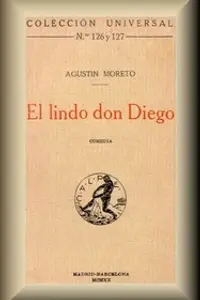Resumen
El lindo don Diego (1662) is one of the most famous comedies by Agustín Moreto, a playwright of Spain’s Siglo de Oro.
The play is a sharp satire of vanity, narcissism, and social pretensions.
The central character, Don Diego, is a conceited young man obsessed with his looks, convinced that every woman admires him.
His exaggerated self-love blinds him to reality, providing endless comic situations.
Meanwhile, the plot weaves around romantic intrigues, mistaken assumptions, and clever disguises, typical elements of Golden Age theater.
Through witty dialogue and farcical situations, Moreto exposes the ridiculousness of excessive pride and self-absorption, while offering a lively portrait of 17th-century manners and social dynamics.
The play balances humor with subtle moral critique, making it a classic of Spanish comedic tradition.
